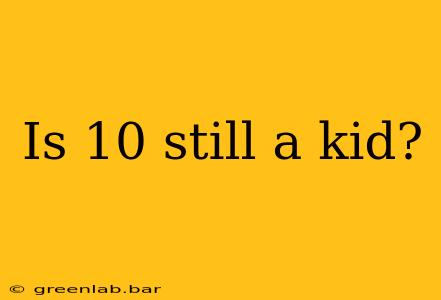The question, "Is 10 still a kid?" is a surprisingly complex one, sparking debate among parents, educators, and the 10-year-olds themselves! The answer, as with most developmental milestones, isn't a simple yes or no. It depends heavily on individual maturity, societal expectations, and the specific context.
The Shifting Sands of Childhood
Ten-year-olds occupy a fascinating space: they're bridging the gap between carefree childhood and the burgeoning independence of adolescence. While they still retain many childlike qualities—playfulness, dependence on caregivers, a vibrant imagination—significant changes are underway. Physically, puberty might be starting for some, leading to rapid growth spurts and the beginnings of secondary sexual characteristics. Cognitively, their reasoning abilities are developing, allowing for more abstract thinking and problem-solving. Socially, peer relationships take on increased importance, and the influence of friends becomes more pronounced.
Physical Development at Age 10:
- Growth spurts: While not universal at this age, some children experience significant height and weight increases.
- Fine motor skills: These are generally well-developed, enabling intricate tasks like writing and drawing.
- Coordination: Improved coordination allows participation in a wider range of sports and activities.
Cognitive Development at Age 10:
- Abstract thinking: The ability to think beyond the concrete begins to emerge, allowing for more complex problem-solving.
- Logical reasoning: Children at this age can start to understand cause and effect and apply logical reasoning to situations.
- Memory and concentration: Memory and concentration skills continue to improve, supporting academic learning.
Social and Emotional Development at Age 10:
- Peer influence: Friendships become increasingly important, influencing behavior and self-esteem.
- Independence: A desire for greater independence and autonomy is common.
- Emotional complexity: Experiencing a wider range of emotions, including more complex feelings like empathy and self-consciousness.
The Blurred Lines: Kid vs. Tween
The term "tween" (short for "in-between") accurately describes the liminal space occupied by 10-year-olds. They aren't toddlers, nor are they teenagers. They are in transition, developing at their own pace, and their needs and capabilities vary greatly. What might be appropriate for one 10-year-old might be completely unsuitable for another.
Considering the Context:
The answer to "Is 10 still a kid?" depends heavily on the context. In some situations, a 10-year-old might be treated as a child (e.g., needing parental supervision, requiring assistance with tasks). In others, they might display a level of maturity and independence that warrants more adult-like treatment (e.g., being given more responsibility, having more freedom).
For example:
- At school: A 10-year-old is generally considered a child, requiring guidance and support from teachers.
- At home: The level of independence allowed will vary depending on the family's values and the child's maturity.
- With friends: A 10-year-old may engage in activities and conversations that would be considered more appropriate for older children.
Conclusion: A Spectrum of Development
Ultimately, labeling a 10-year-old as simply "a kid" or "not a kid" is an oversimplification. They are complex individuals navigating a period of significant growth and change. Understanding their developmental stage, individual capabilities, and the specific context is crucial for providing appropriate support, guidance, and opportunities for growth. Instead of focusing on a definitive label, it's more helpful to consider the spectrum of development and tailor interactions to the individual child's needs and maturity level.

